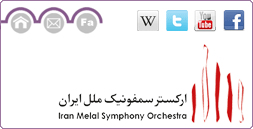Conductor
Peyman Soltani - The Conductor of Iran Melal Symphony Orchestra Peyman Soltani, composer, conductor, musician and music theorist, was born in Tabriz on January 17th, 1971 in a cultured middle-class family originally from Kerman. He was four when his family moved back to Kerman and then at the age of 16 they all immigrated to Tehran. He embarked on his career in music, painting and literature at an early age (1978) by attending workshops held in the Culture and Art Organization and the National Iranian Radio & Television. Later on he proceeded with his studies in the fields of graphics and music. His childhood teachers were Mohammad Emam, Mohammad Hajizadeh, Khalil Borhani, and his mother, Farkhondeh Hajizadeh (a writer and poet). After his immigration to Tehran in 1988, he learned to play the Iranian musical instruments santoor, tar, and setar from prominent musicians such as Faramarz Payvar, Majid Kiani, Hooshang Zarif, etc. He also learned composition, conducting, harmony, counterpoint, orchestration and form from Dr Mohammad Taghi Masoudieh, Farhad Fakhreddini, Professor Emanuel Malik Aslanian, Professor Thomas Christian David, Professor Yuri Davitian, etc. He has been teaching music, fundamentals of musical composition, introduction to schools, movements and trends of music in the 20th century, understanding music, history of music, combination of music and poetry, new methods of singing and philosophy of contemporary music since 1989; since 1990 he has expanded his career by staging concerts, composing music, lecturing, performing, holding master classes and workshops in addition to publishing articles, reviews and music research in Iran and abroad. Soltani supervised and managed Shabanrood and Shenidastan music groups from 1990 to 2000. He also established Aghaz Music Association in 1994 and managed it for five years. In 1993 he was invited to teach music, music theory and solfege in Sooreh Educational Center and worked there for two years. Soltani played in the first round of the plectrum orchestra managed and conducted by Hossein Dehlavi in 1992. In 1998 he became the manager of the first Iranian music house in Sarv Cultural Center. He was a member of the Association of Iranian Journalists from its establishment to its closure, and a member of the International Federation of Journalists. He founded and managed the Association of Contemporary Iranian Composers from 2002 to 2005. He has been a member of the International Committee for Museums and Collections of Instruments and Music (ICOM) since 2005 and the manager of the ICOM Committee for Music in Iran. He was the curator of the Avaha & Navaha Music Museum in Shiraz from 2004 to 2007. He was a member of the Association of Reviewers & Researchers of the Tehran Museum of Contemporary Arts in 2005 and has sporadically taught in Tehran University of Art since 2005. He has been an honorary member of the Iranian Writers' Association since 2015. In 2004 Peyman Soltani founded Takht-e-Jamshid (Persepolis) Symphonic Orchestra, collaborating with Iran Cultural Heritage Organization and the Iranian National Commission for UNESCO. The orchestra was renamed Mellal Symphonic Orchestra a year later, and it has been privately funded and managed by Soltani since 2006. He has also been actively involved in other fields such as graphics, poetry, literature and philosophy. He learned aesthetics and the philosophy of art from Dr Reza Baraheni and is considered one of his distinguished students. He learned contemporary philosophy and history from Dr Manoochehr Badiee and combination of poetry and music, prosody and rhyme from Hooshang Ebtehaj. He has been the art director and graphic designer for Vistar, Daricheh, Agra and Jamehdaran publishing institutes since 1997. Currently, he has several books and albums to put out. His other activities include:
Peyman Soltani has judged in several music, culture and art festivals. He has also held meetings on women's music and conducted ceremonies to pay tribute to noted musicians. He has done research in the history of music and Iranian folk music. He has participated in radio and TV shows as an expert reviewer to promote Iranian and world music. Formerly he advocated analytical (existential) philosophers in his music and philosophical reviews. In his music, he initially followed pioneering modern and postmodern composers, particularly those belonging to Darmstadt School. In recent years, however, he has been searching for identity, humanism, understanding human nature and structuralism in his works and he endeavors to compose creative music without borders, yet adhering to his national identity. He believes protest against reality comprises the creative core of a work of art because in a class conscious society the artist is mostly deprived of his/her real privileges. He believes every novel approach to art starts with rebellion and the artist has to free his/her imagination from any restrictions and avoid being monopolized in any way. |

| |
 |
 |
 |
 |
 |
 |